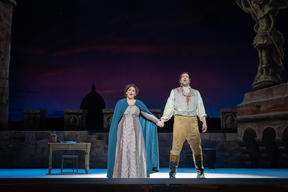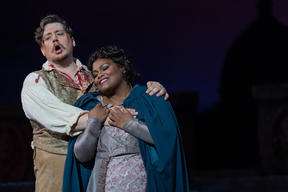|
Back
A Not-too-Shabby Shocker Washington
The Kennedy Center
05/11/2019 - & May 12*, 14*, 19, 20, 22, 25, 2019
Giacomo Puccini: Tosca
Keri Alkema/Latonia Moore (Tosca), Riccardo Massi/Robert Watson (Cavaradossi), Alan Held (Scarpia), Michael Hewitt (Cesare Angelotti), Wei Wu (Sacristan), David Cangelosi (Spoletta), Samson McCrady (Sciarrone), Holden Browne/Aidan Stanton-Brand (Shepherd Boy), Samuel J. Weiser (Jailer)
Washington National Opera Chorus, Steven Gathman (Chorus Master), Washington National Opera Orchestra, Speranza Scappucci (Conductor)
Ethan McSweeny (Director), Gary Marder (Lighting Designer), Lena Rivkina (Costume Designer), Casey Kaleba (Fight Coordinator)

K. Alkema, R. Massi (© Scott Suchman)
Tosca, not without cause, has a reputation as opera’s ultimate potboiler; for me, it stands in spite of this as one of the most cohesive and musically balanced of Puccini’s completed major operas, alongside La fanciulla del West. If the latter—however improbably—avoids the worst of the maudlin sentimentality that is Puccini’s Achilles’ heel, this is due to its through-composition; insofar as the earlier and much more famous Tosca does the same, we have the fast-moving and boldly outlined (albeit sensationalistic) plot to thank for imposing a firm structure and sense of direction on the music. To borrow a notorious phrase from Joseph Kerman, a shocker it surely is, but the music, if not the last word in subtlety, is hardly shabby at all but rather marked by a tremendous degree of sophistication and expressive variety; one can see why Verdi complained that the young Puccini thought more symphonically than operatically, although this seems hardly a just ground for criticism.
The current Washington National Opera production of the work is not too shabby itself, with much to enjoy from both casts, even if my few reservations mainly concern the alternating principals (Tosca and Cavaradossi—the reliable Alan Held portrays Scarpia in all performances). It has been some time since Italian opera in this country was dominated by Italian tenors, and so there was some excitement in the appearance of the young Riccardo Massi as Cavaradossi in all performances but the matinees of May 12 and 19. And from his first appearance onstage in Act I an exceptional voice was in evidence, dark and rich and capable of great ardor. Yet he scoops far too frequently, even when repeating a pitch. The American Robert Watson may boast a somewhat less rich and open voice, and he experienced some pitch and rhythm issues during the gorgeous Act I love duet, but he cuts through the orchestra well and is a fine musician. Watson’s Tosca, Latonia Moore (also American), was somewhat lacking in the Italian pronunciation department, and her projection at lower volume was not always ideal, yet her fullness of sound at forte was impressive, and she delivered an affecting “Vissi d’arte,” with lovely tone to boot. In the main cast, on the other hand, Keri Alkema’s confident characterization was let down by an often intrusive vibrato. On the whole, in spite of some problems, I was more consistently impressed with the matinee cast.

R. Watson, L. Moore (© Scott Suchman)
As for the rest of the production, Alan Held portrayed Scarpia with as much dignity as the character could bear, and the comprimario parts were consistently well sung. I was grateful that conductor Speranza Scappucci did not underplay the accompaniment even at its most grandiose; although on Sunday the orchestral playing in the more lyrical passages seemed a little lacking in momentum, on the whole her interpretation was by turns sensitive and thundering where it needed to be. If the playing was not especially lush or even refined, the touch of roughness does help to keep a sense of excessive sentimentality at bay. And last but not least, the tasteful and carefully detailed set, borrowed from the Seattle Opera, proves that Zeffirellian opulence is not necessary to create a grandly evocative setting.
Samuel Wigutow
|